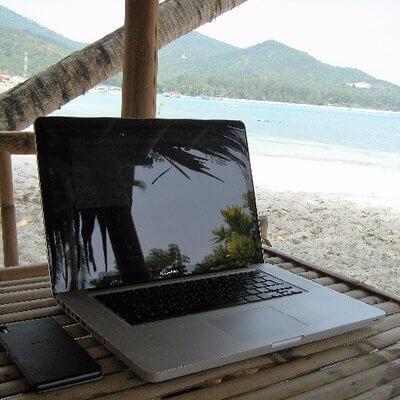What advice would you give someone considering a remote job?
You have to be very organized. Keep your work calendar up to date, set time in your schedule for breaks and social activities. Also, change your environment—I work at home or coffee shops.
Don’t think twice. Act now. You won’t regret it. I look back at all the time I wasted in inflexible 9 to 5’s and it makes me cringe.
Discipline. It takes a lot of discipline to work remotely as you’ll find that it is very easy to put off a piece of work when you’re sitting at home. There are no firewalls stopping you from accessing Facebook and Twitter, the Xbox might be sat saying “just one more game,” and before you know it a month has passed and you’ve done nothing.
Just do it! (You are probably doing lots of things remotely already…on the phone and by email…so imagine now if you go fully remote, all the freedom you will have.)
But set yourself some discipline…
And make a plan for your social life…
If you work from home, get dressed as early as possible…and go out as much as possible (at least once a day…)
Be brutally honest with yourself. Are you disciplined and conscientious? If you are, then working remotely is a fantastic option. If you thrive in a setting where there are lots of people around and you feel like that’s an important experience, then working from home probably isn’t for you.
The adjustment can be surprisingly difficult. You must never lose sight that you have a “real job”—family and friends tend not to think of telecommuting as real work.
Make sure you’re good with deadlines and self-motivation. It’s incredibly easy to become distracted if you rely too much on outside guidance and management to get things done.
This sounds somewhat trite, but “Just do it.” I seemingly found every excuse not to leave the confines of the office environment, but in the end I was better off when I just jumped in with both feet.
Take the plunge! It’s a little scary at first, but the time and stress you save with commuting is so worth it. If you want to be in charge of your own time and plan your work around when you work best, you won’t regret heading to the remote workplace.
No convincing—I handed in my resignation and basically crossed my fingers that I’d somehow be able to make a living online. Luckily, I was right, but getting there took longer than I had anticipated, and it was not as straightforward as it seemed for a while in the beginning. I can’t recall any single moment of regret, though, and I’ve never doubted my decision to work and live this way.
Give it a test run first by traveling somewhere while you work. The lifestyle sounds appealing but you may find that it isn’t for you. If so, then you still have something to go home to. If it is for you, then plan to make this your lifestyle accordingly.
Ensure you have a dedicated space. I treat my working space like a recording studio. No red light, but when my door is shut, I am “at work.” I can’t imagine working in a bedroom, kitchen, or dining space. Also, I recommend to switch off your laptop when finished for the day. That draws a line between the workday and the rest of your day.
Start working remotely on a small scale. Go to a city a few hours away from you and stay there for a few weeks. Find an Airbnb, a hotel, or a hostel—whatever you feel comfortable with. Find local meetups and meet new people. If you miss your friends and family or can’t be productive, you can just go home and resume your life. But if you really love it, you’re now confident that it will work for you.
Have a set schedule, and show up to work on time, just as you would if you were going into a physical office. Have a “quitting time” and try to stick to it to keep work restricted to business hours. Brush your hair, because you never know when the boss will want to Skype.
You’ll be most successful as a remote worker if your organization, and especially your direct team, is invested in supporting a remote workforce. That means that async communication is valued, discussions are written down, and people know that decisions can’t always be made in the moment. You’ll also need to make sure that you’re clear in your communication. It’s easy to misinterpret tone in written communication so you’ll need to be highly tuned in to non-verbal cues from your coworkers and clear up any miscommunications before they become issues.
Make sure it’s the right decision for you. Working remotely isn’t for everyone, and you need to ensure you have what it takes to be successful. You will need to be able to set boundaries, find ways to connect, and keep yourself focused. Also, make sure you understand virtual or remote versus flexible—they are two very different things, and you need to make sure you understand the expectations.
I think it’s important to be realistic about the limitations on resources and/or access to technology in some far flung places. While it might sound romantic to work from the desert, it doesn’t often translate to a productive day. The more a business grows, the more solid the infrastructure needs to be, which is why researching destinations fully and testing them out matters.
I also think it’s important to leave space for the psychological changes that come with remote work without a fixed residence. It might seem easy, and it is great, but the opportunity costs of stability and certainty are ones that people underplay. Both are important to discuss with fellow remote workers, and to acknowledge as valid. Doing so will only make your business stronger.
Make sure that you have a secure, dedicated space to work. It’s not about multitasking on the couch; you want to be free from distractions and have the tools and environment you need to focus.
Know thyself. You must have a high level of self-awareness, self-discipline, and self-management to be productive and successful and maintain life/work balance. When people hear that we can choose our own hours and location, it sounds like a dream; and for most, it is. But not everyone is suited for remote work.
Building a sense of trust with your manager is key. Open and frequent communications, status updates on your work, all help to build that trust.
Consider what you will miss about the office environment and find ways to recreate it or compensate for it. For example, if you are an extrovert who enjoys socializing with colleagues, make a point to communicate with them via instant message or email as you would have if you were available in person. Also, working remotely will require a lot of self-discipline both to keep you focused on your work as well as to set healthy boundaries for work/life balance.
When people first go remote, they usually have some trouble figuring out the right place for the work they’re doing. Being able to work from anywhere gives us the luxury to design workspaces where we are most productive. Whether we are telecommuters, freelancers, or digital nomads, setting up a productive workspace will help us be better remote workers. We each have different needs when it comes to productivity. Some people prefer a quiet space on their own, while others thrive with people around. Some like going to the office, while others prefer to work on the road.
Change is scary, but I’ve learned that when something scares you it’s a signal you’re meant to go for it. Create goals that will get you that remote job and start working toward them to distract you from the fear.
Imagine what your lifestyle would look like if you were to work from home. If you can’t imagine it then you have some decisions to make. What changes would you need to make in your life so that working remotely is possible? This vision will work nicely with the goals I recommended before.
Last, get real clear on your personal and professional values and priorities. When things come into question, it’s a time and energy waster to hem and haw over a decision. When you work remotely, time is precious, especially if your schedule is flexible. Every minute counts so you can’t afford to use it and your energy on being uncertain. Your values and priorities are what dictate your choices and help you balance your work and your personal life.
Don’t overplan. You do not need a steady stream of “passive income.” You do not need special skills. You do not need a padded savings account. You DO need tenacity. You do need to be willing to make some sacrifices. You do need to realize your life will change in ways you can’t imagine right now (mostly for the better). You do need to become very resourceful.
I love that at Skillcrush I’m in communication with my team pretty much all day. But on weeks when that hasn’t been the case, I’ve quickly started to feel the lack of social interaction. Before you take a remote job, find out how much communication you’ll have with your team (via video, chat, email, etc.) and think about what you want and need. I find that while no one wants to be in video calls all day, if I go too long without seeing a coworker face-to-face I start to get glum…and less productive!
Before I decided to quit my office job, I made sure to get an online job part-time. Consequently, when I finally resigned from the company I was working with, I was already prepared find freelance jobs online. I also prepared by saving money good for few months in case I wasn’t able to find other online jobs.
Remember that it’s gonna suck. They’ll forget you exist, they’ll ask “when are you coming up next,” and they don’t know how to set up the camera.
Have a cash reserve for at least 6 months of living expenses. Be realistic about your work ethic and how much you can actually accomplish. Set schedules and manage time efficiently. Talk to veteran remote workers whose careers you’d like to emulate. Be willing to work hard.
It’s not for everyone. Not only do you need to be disciplined enough to sit down and get your work done without anyone looking over your shoulder, you need to know you can deal with spending your days alone (most of the time). Also, get a dog. They force you to get up from the desk and stretch your legs.
You’d better be quite disciplined and motivated. Also, when you’re working, avoid distractions like background music, radio, etc.





























